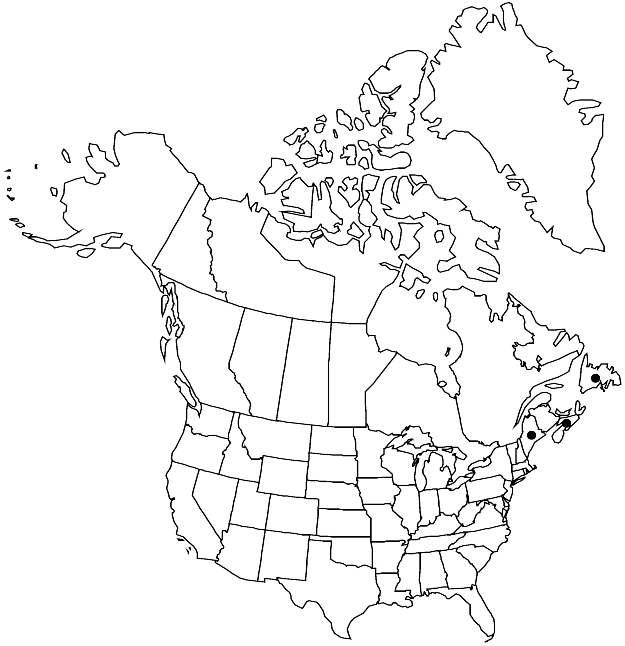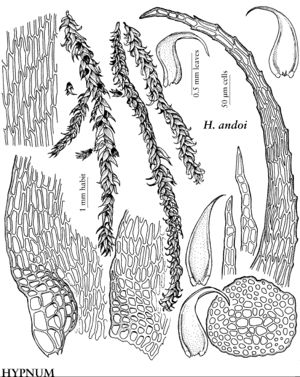Difference between revisions of "Hypnum andoi"
J. Bryol. 11: 606. 1982.
FNA>Volume Importer |
FNA>Volume Importer |
Revision as of 19:47, 24 September 2019
Plants small, pale green to yellowish. Stems 2–8 cm, pale yellowish brown, creeping, not complanate-foliate, usually irregularly to regularly pinnate in horizontal plane, branches 1–2 cm; hyalodermis absent, central strand weakly developed; pseudoparaphyllia subfilamentous to lanceolate. Leaves closely imbricate, weakly to strongly falcate-secund, ovate- or oblong-lanceolate, tapering gradually to apex, 1–1.8 × 0.3–0.6 mm; base not decurrent, not auriculate; margins often recurved near base, sharply serrulate; acumen short or more usually long; costa double and short or indistinct; alar cells subquadrate, region moderately well defined, of (5–)7–10(–13) cells along margins, marginal ones enlarged and hyaline, inner ones brownish; basal laminal cells shorter, wider than medial cells, usually yellow or yellowish brown, walls not pitted or porose; medial cells (40–)50–60(–70) × 4–5 µm. Sexual condition dioicous; inner perichaetial leaves oblong-lanceolate, margins serrulate in apex, acumen long, costa obscure. Seta yellowish to reddish, 0.1–1.7(–2) cm. Capsule erect to inclined, yellowish to reddish, oblong-cylindric, 1.5–1.8(–2) mm; annulus 2- or 3-seriate; operculum conic (rounded-mammillate); endostome cilia 1 or imperfectly 2, very fragile.
Phenology: Capsules mature Mar–Apr.
Habitat: Vertical surfaces of tree trunks and rock cliffs
Elevation: low to high elevations (0-2000 m)
Distribution

Nfld. and Labr. (Nfld.), N.S., Maine, Europe.
Discussion
Hypnum andoi is a temperate species of amphi-Atlantic distribution that produces sporophytes in late autumn. The plants are closely affixed to the substrate; the pseudoparaphyllia are tipped by one elongate cell; and the alar cells are often brown and weakly excavate. This species resembles H. cupressiforme var. filiforme, but the leaves of H. andoi are long-attenuate, and the row of basal hyaline cells in the alar region is decidedly different, reminiscent of Sematophyllum (Sematophyllaceae). The shorter, stouter capsule and mammillate operculum are also valuable characters, but sporophytes are extremely rare in North America and have a conic operculum, rather than a mammillate one as in Europe.
Selected References
None.
